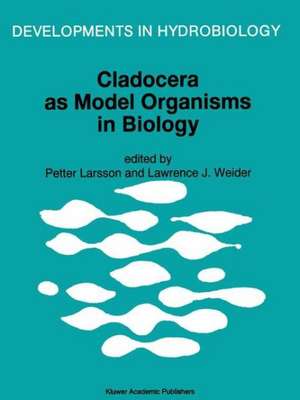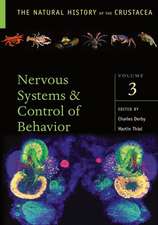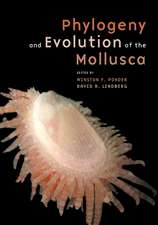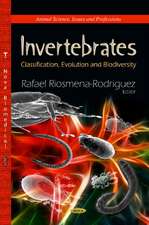Cladocera as Model Organisms in Biology: Proceedings of the Third International Symposium on Cladocera, held in Bergen, Norway, 9–16 August 1993: Developments in Hydrobiology, cartea 107
Editat de Petter Larsson, Lawrence J. Weideren Limba Engleză Hardback – 31 oct 1995
The Cladocera occupy an intermediate position in lake ecosystems, both as plankton and benthic organisms. Their often high abundance and their function, as transfer organisms from algae and dead organic matter to macro-invertebrates and fish, make them one of the most important organisms to affect the biological processes in freshwater ecosystems. The Cladocera living among the plankton often have recognizable distribution patterns and migrations; their size and brief life cycles make them popular in laboratory experiments; their cyclic parthenogenesis makes them suitable for many aspects of population genetics; and they are present as microfossils in lake sediments. All these features confer a unique status on the Cladocera as model organisms in many aspects of modern systematics and ecology.
| Toate formatele și edițiile | Preț | Express |
|---|---|---|
| Paperback (1) | 797.73 lei 38-45 zile | |
| SPRINGER NETHERLANDS – 2 noi 2012 | 797.73 lei 38-45 zile | |
| Hardback (1) | 956.99 lei 6-8 săpt. | |
| SPRINGER NETHERLANDS – 31 oct 1995 | 956.99 lei 6-8 săpt. |
Din seria Developments in Hydrobiology
- 18%
 Preț: 1229.10 lei
Preț: 1229.10 lei - 18%
 Preț: 959.98 lei
Preț: 959.98 lei - 18%
 Preț: 963.91 lei
Preț: 963.91 lei -
 Preț: 788.40 lei
Preț: 788.40 lei - 15%
 Preț: 648.24 lei
Preț: 648.24 lei - 15%
 Preț: 637.89 lei
Preț: 637.89 lei -
 Preț: 378.23 lei
Preț: 378.23 lei - 15%
 Preț: 644.95 lei
Preț: 644.95 lei - 18%
 Preț: 952.09 lei
Preț: 952.09 lei - 20%
 Preț: 558.87 lei
Preț: 558.87 lei - 18%
 Preț: 1833.65 lei
Preț: 1833.65 lei -
 Preț: 393.59 lei
Preț: 393.59 lei -
 Preț: 406.54 lei
Preț: 406.54 lei - 18%
 Preț: 1226.73 lei
Preț: 1226.73 lei -
 Preț: 388.87 lei
Preț: 388.87 lei - 24%
 Preț: 1060.51 lei
Preț: 1060.51 lei - 18%
 Preț: 1229.28 lei
Preț: 1229.28 lei - 20%
 Preț: 569.30 lei
Preț: 569.30 lei -
 Preț: 368.79 lei
Preț: 368.79 lei - 24%
 Preț: 817.46 lei
Preț: 817.46 lei - 18%
 Preț: 958.25 lei
Preț: 958.25 lei - 18%
 Preț: 953.03 lei
Preț: 953.03 lei -
 Preț: 384.75 lei
Preț: 384.75 lei - 24%
 Preț: 1582.91 lei
Preț: 1582.91 lei - 24%
 Preț: 1051.68 lei
Preț: 1051.68 lei - 18%
 Preț: 943.57 lei
Preț: 943.57 lei - 18%
 Preț: 1235.76 lei
Preț: 1235.76 lei - 24%
 Preț: 800.02 lei
Preț: 800.02 lei - 24%
 Preț: 803.55 lei
Preț: 803.55 lei - 18%
 Preț: 948.29 lei
Preț: 948.29 lei
Preț: 956.99 lei
Preț vechi: 1167.06 lei
-18% Nou
Puncte Express: 1435
Preț estimativ în valută:
183.15€ • 190.71$ • 154.78£
183.15€ • 190.71$ • 154.78£
Carte tipărită la comandă
Livrare economică 07-21 martie
Preluare comenzi: 021 569.72.76
Specificații
ISBN-13: 9780792334712
ISBN-10: 079233471X
Pagini: 307
Ilustrații: XVI, 307 p.
Dimensiuni: 178 x 254 x 19 mm
Greutate: 0.78 kg
Ediția:Reprinted from HYDROBIOLOGIA 307:1-3, 1995
Editura: SPRINGER NETHERLANDS
Colecția Springer
Seria Developments in Hydrobiology
Locul publicării:Dordrecht, Netherlands
ISBN-10: 079233471X
Pagini: 307
Ilustrații: XVI, 307 p.
Dimensiuni: 178 x 254 x 19 mm
Greutate: 0.78 kg
Ediția:Reprinted from HYDROBIOLOGIA 307:1-3, 1995
Editura: SPRINGER NETHERLANDS
Colecția Springer
Seria Developments in Hydrobiology
Locul publicării:Dordrecht, Netherlands
Public țintă
ResearchCuprins
What can molecular markers tell us about the evolutionary history of Daphnia species complexes?.- Genetic variation in Simocephalus (Anomopoda: Daphniidae) in North America: patterns and consequences.- Large Hardy-Weinberg equilibrium deviations in the Daphnia longispina of Lake El Tobar.- Differences in genetic structure and ecological diversity between parental forms and hybrids in a Daphnia species comple.- Effects of salinity on the life history and fitness of Daphnia magna: variability within and between populations.- Changing attitudes toward chydorid anomopods since.- Phylogeny and adaptive radiation within the Anomopoda: a preliminary exploration.- The evolution of groundwater Cladocera.- Altitudinal distribution of tropical planktonic Cladocera.- The conservation ecology of the Podonidae from the Caspian and Aral Seas.- Distribution and biology of marine cladocerans in the coastal waters of southern China.- Synergistic effects of different food species on life-history traits of Daphnia galeata.- Effects of Microcystis aeruginosa on interference competition between Daphnia pulex and Keratella cochlearis.- The influence of prey hardness on Daphnia ’s selectivity for large prey.- Egg size and egg mass of Daphnia magna: response to food availability.- Reduced digestibility of UV-B-stressed and nutrient-limited algae by Daphnia magna.- UV-B tolerance of alpine and arctic Daphnia.- An account of a preliminary mechanistic model of swimming behaviour in Daphnia: its use in understanding diel vertical migration.- Life history characteristics of Daphnia magna clones in phototactic behaviour.- Diel horizontal migration and swarm formation in Daphnia in response to Chaoborus.- Behavioural and morphological changes in polymorphic Daphnia related to different predationregimes.- Seasonal occurrence and diel locomotor activity in littoral Cladocera in a mesohumic lake in Norway.- Effects of predator-released chemicals on some life history parameters of Daphnia pulex.- The influence of a fish exudate on two clones of the hybrid Daphnia galeata × hyalina.- Changes in epibiotic burden during the intermolt of Daphnia determined by hypodermal retraction stages.- An in situ test of the effects of food quality on Daphnia population growth.- Interrelationships between crustacean Zooplankton and phytoplankton: results from 15 years of field observations at the mesotropic Saidenbach Reservoir (Germany).- Life history characteristics and distribution of Bythotrephes longimanus Leydig (Crustacea, Onychopoda) in the Biesbosch reservoirs.- Competition or niche segregation between Holopedium and Daphnia; empirical light on abiotic key parameters.- Interactions between Nile tilapia (Oreochromis niloticus) and cladocerans in ponds (Khartoum, Sudan).- Leptodora kindti: efficient predator and preferred prey item in Neusiedler See, Austria.- Cyclomorphosis as a factor explaining success of a Daphnia hybrid in Tjeukemeer.- Morphological variation and population dynamics of Bosmina (E). longicornis kessleri Uljanin (Crustacea: Anomopoda: Bosminidae) in the Bukovec Reservoir (S. E. Slovakia).








